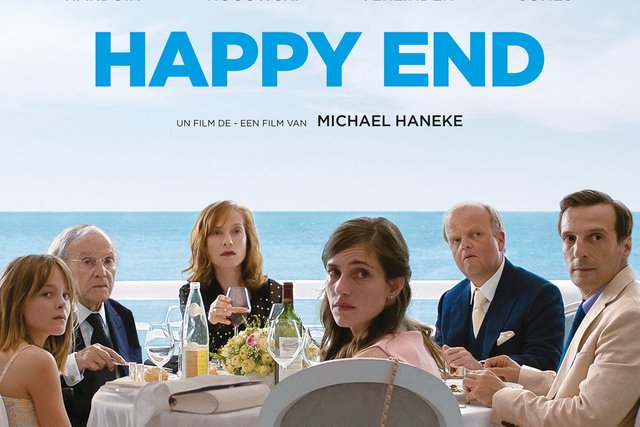🎬 FILM REVIEW : Happy End

Michael Haneke, Austrian film director initially recognized and valued in the circle of fans of abstract and unconventional European film, today carries the title of one of the greatest contemporary European directors. His latest film Happy End has become the topic of many debates in the field of film criticism over the past few months.
Namely, this family drama can be regarded as a logical contemporary continuation of Haneke's film opus, although it was pronounced sketched, vague, and underdeveloped in the media, and Michael Haneke's inadequate audience would be bothered by its meaning in deliberations similar to those of the repetitive scene in the center of The Discreet Charm of the Bourgeoisie.
Although the director himself once acknowledged that, given that he holds the title of a European director, he is unable to make a genre film, but Happy End is a very close to genre film, if we try to understand the genre as unique and authentic Haneke's work.

After love comes death
Happy End, according to the rest of Haneke's opus, can be defined as a satirical and dreary family drama in the center of which is a wealthy European bourgeois family Laurent who lives in the French city of Calais. The film starts with a series of short video footage of the mobile phone, which at the very beginning is a visual texture made through social media that permeates the whole drama.
This series of short and quiet voyeuristic videos that contain the twelve-year-old girl Eva (Fantine Harduin), whose character remains hidden, is accompanied by descriptions that express antipathy to her own mother, but also to the lives of those around her. After one of the videos, we find out that Eve had drugged her own mother with sedatives, and she ended up in the hospital for the same reason. The act begins when Eve comes to Calais to live with her father Thomas (Mathieu Kassovitz) his wife Anais (Laura Verlinden) and their newborn child.Thomas's new family lives on a luxurious family estate with his sister Anne (Isabelle Huppert), her neurotic son Pierre (Franz Rogowski) and father and owner of the property Georges, whose character is embodied by Jean-Louis Trintignant. Laurent's family seemingly underpinned by the routine of sumptuous and exquisite family gatherings, tackling the problems of family business, and restrained conversations and glances during quiet family meals, but their routine trembles irresistibly to the sense of loss and nothingness and the grotesque desire for death, which is manifested most in desperate attempts of Georges Laurent to take his own life.
It's precisely the desire for death that is at the very least ironized by members of the high social class. If we recall Haneke's love drama Amour(2012), at the center of which is the old intellectual couple embodied by Jean-Louis Trintignant and Emmanuelle Rivers, Happy End can be regarded as its kind of sequel, which, apart from acting and interplay of characters, testifies eternally interlaced motives of love and death.
Happy ending?
Haneke's film poetics have always been based on the motives of human dehumanization in modern times and mechanization of social routines. Happy End, therefore, combines elements that, as an eternal inspiration, mark Haneke's opus portraying a family that is directed towards total nonsense and absurdity in all of its work.
The plot takes place in the background of the current refugee crisis, though almost none of the wealthy family members are aware of, becoming a metaphor of bourgeois selfishness and complete blindness for the social circumstances surrounding them. Still, the cold and turbulent atmosphere of apparent blindness and aspirations for the release of life troubles is pervaded by sharp but subtle humor and powerful ironicism that at some moments reaches the level of grotesque.
Laurent's family becomes another victim of the existential burden and what Haneke himself has labeled with the term glaciation, referring to the cooling of the emotions and anxiety in which his characters move. In addition to its theme and sharp social criticism, Haneke remains faithful to his film-making practices that escalate in long frames or the totality in which the characters are viewed from a privileged position. Moreover, since it's Haneke, it's logical to expect a kind of catharsis that will end in bizarre violence. Still, Happy End encourages the viewer to see humor in the same spot, violence is almost completely absent, and disturbing scenes even in their extremes are weaker and more subtle than those in the earlier opus.
I hadn't heard of this movie. Its title sounds like the opposite of what you expect of his films/ stories. Although, sometimes filmmakers change, when they get older...
Thanks for sharing! :>)
Hello @marinauzelac, thank you for sharing this creative work! We just stopped by to say that you've been upvoted by the @creativecrypto magazine. The Creative Crypto is all about art on the blockchain and learning from creatives like you. Looking forward to crossing paths again soon. Steem on!